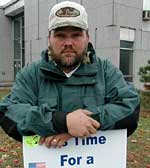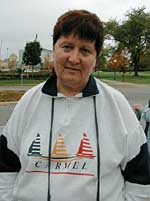State agencies struggle to provide services
By Patty Marsicano
Minnesota Public Radio
October 10, 2001 As mediation resumes Thursday in the state workers strike, the impact of the walkout is being felt in a number of state services. Crime evidence isn't being analyzed, jobless claims are hampered, and the State Health department can't investigate a new e. coli outbreak to the extent it needs to.
| |
|
|
|
||
"Our resources are stretched because of bioterrorism, the strike, and this outbreak all occurring simultaneously," Hull says.
Health Commissioner Jan Malcolm says while her office is protecting what she calls "priority areas" - she says the strike is taking a toll. The Bureau of Criminal Apprehension can receive new evidence from crimes scenes, but cannot analyze it. Those analysts are on strike. Assistant BCA Superintendent Tim O'Malley says their absence could make a difference in investigators' ability to track down suspects.
"If there's hair fibers or some saliva or semen taken from the crime scene, it may be that the analysis of that will directly lead to a suspect," says O'Malley."But that work isn't being done yet, so the investigations have to go on without knowing the results of some of this forensic evidence."
O'Malley says there's normally some backlog of evidence - but the strike will add to that. The BCA's new crime lab in Bemidji did not open as scheduled October 1, that was the first day of the strike.
Sharon Zoesch is the Ombudsman for Older Minnesotans. Her office normally has 18 people to visit and take complaints about the six state-run nursing homes. But now, most of them are striking, which means fewer site visits to those homes. Zoesch says there have been some complaints about meals being served late, and more serious complaints as well from residents getting care from replacement workers.
"We have one complaint about some specific therapy that should be provided normally on a daily basis that wasn't happening. A couple of complaints about people not being toileted in a timely manner, and a concern about staff not being sufficient to feed people who are extremely heavy care and need total eating assistance in one of the facilities," she says.
| |
|
|
|
||
Some of the people who apply for unemployment are being affected. Jack Weidenbach, who directs the state's unemployment insurance program, says for the one-quarter of the cases - those in which there is some dispute about eligibility - a backlog is developing.
"The 25 percent that requires staff work - normally we're very much slowed down on those, though we're trying to get as many as possible done. Obviously, with most of our staff out, we're severely hampered," he says.
Weidenbach says the other 75 percent of claims go through an automated system, and are unaffected. But even there, he says, the people who would normally fix any problems with that automation are on strike. He says supervisors are overseeing that work right now. But in a worst case scenario, one which would require a lot of work to get the system up and running in case of a breakdown, would "really present some problems for us."
About 200 state parole officers are on strike. They serve 56 outlying counties - Minnesota's largest counties employ their own probation officers. The state workers oversee 20,000 of the state's 126,000 people on probation or parole. "We're doing the best job we can to provide for public safety under circumstances that aren't our choosing," says State Corrections Commissioner Sheryl Ramstad Hvaas.
Ramstad Hvaas says her office has made it a priority to intensely supervise the top 150 highest-risk offenders, those convicted of crimes like murder and sexual assault. But she says some paperwork might be delayed for low risk offenders.


